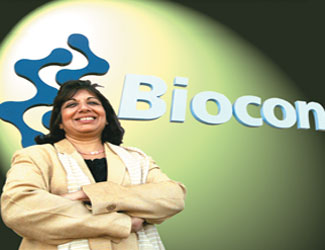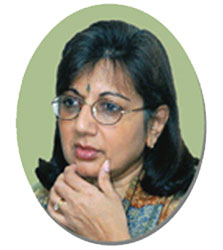| |
THAT HEADY FEELING
Kiran Mazumdar Shaw may be India’s richest woman but getting crowned the country’s biotech queen wasn’t a walk in the park
By Joshua David in Bangalore

|
|
IF Bangalore is home to India’s richest man,
Wipro chairman Azim Premji, it also has the Icountry’s richest woman, Kiran Mazumdar
Shaw. From India’s first female brew master to
being a brand ambassador for the biotech industry
in India, Shaw’s story is a heady brew of success.
It was on April 7 this year that Shaw, 50, made
it to the league of the seriously rich. That day her
company Biocon an Irish firm she initially did
business for and later bought
debuted on the bourses. Investors queued up to buy Biocon
|
shares like
they were going out of fashion, propelling the firm’s value to well over $1
billion.
Within hours of the IPO opening, Shaw’s
personal net worth touched $428 million, and she
was rubbing shoulders with the likes of Infosys
founders N.R. Narayana Murthy and Nandan Nilekani. Not bad for someone who began her
company in 1978 with just $250 out of her garage
(Yes, somehow all New Economy success stories
kick off in a rented garage).
But getting crowned India’s biotech queen was
no get-rich-quick story. Shaw found the climb an
arduous one.
In the early 1970s, a brew master who worked
for India’s liquor baron Vijay Mallya sent his
daughter to Australia to study what he was good at.
(For those not in the loop, the job involves mixing
yeast and enzymes to get that perfect head of beer).
What is remarkable is that she was able to
pursue a course meant mainly for the liquor trade
despite belonging to a Brahmin family from
Gujarat, which even today prohibits alcohol.
|
DIFFERENCE IN DNA
Biocon sees big opportunities
overseas in the next few years as
drugs go off-patent, sparking demand
for cheaper copycats. Indian
companies, rich in low-cost research
skills, are usually the first off the
blocks to come up with generic
versions. Biocon’s slogan is "The difference
lies in our DNA." The group’s client list
boasts the largest global pharma
companies such as Glaxo-Wellcome,
Bristol Myers Squibband AstraZeneca. Though money has
never been a problem for her own
endeavours, she realises that a whole new generation of biotech entrepreneurs
are being held back due to lack
of resources. Rivals in the insulin market include Denmark’s Novo Nordi and
US-based Eli Lilly. Biocon holds about 130 patents, six
of them in insulin
|
|

|
making and 20 in statins.
After her training Down Under, the young girl
returned to Bangalore only to discover that most
breweries back home were male fiefdoms and
were not comfortable employing a woman. She
had to bury her desire to become India’s first
female master brewer. Frustrated, she turned to
her first love — molecules.
They say luck is what happens when
preparation meets opportunity. At 25, when her
friends were seeking safety in marriage, she had a
chance referral to an Irish biotech company. She
started with successfully extracting from papaya an
enzyme used to tenderize meat, among other
things, and from the bladders of fish a collagen that
helps clarify beer. The molecules had begun to pay.
Biocon is named after Shaw’s Irish joint
venture partner, later taken over by Unilever. The
Indian founders bought back the stake when the
Anglo-Dutch group decided to exit in 1998 leaving
the name behind for the Indian company.
Life is strange, she says, talking about how she
set up the small gig in 1978 in her rented house in
Bangalore. "I had to make the most of my available
resources. I used that garage for the first three
years of my operations and then I moved into
another rented office in town."
Worryingly for the competition, Biocon’s strength is the ability to cut costs,
keep margins flat. Shaw’s price warrior tag comes from her early days when
paring costs to the bone was the only way to stay ahead of the competition. It
is a ruthless form of corporate Darwinism.
|
Shaw can now afford an office that’s a little less
Spartan. Biocon has moved into a spanking new
80-acre campus with world class facilities on
Hosur Road, chock-a-bloc with IT majors such as
Infosys and Digital. Perhaps fittingly, Wipro is on
Sarjapura Road on the opposite side.
Her life’s joint venture was equally
serendipitous. If it was an Irish company that
launched her on the road to success, the second
push in her life came from Scotland, her husband
John Shaw’s country. They met in Bangalore where
he was posted as the head of Madura Coats.
Her friends say she has tremendous will
power. Former Karnataka government
biotechnology secretary Vivek Kulkarni, who’s
now the CEO of the tech firm B2K Corp, says Shaw
can achieve just about anything that she sets out to
do. Kulkarani says she helped him and other
officials in drafting the Karnataka government’s
biotechnology vision statement.
Shaw is a people person. Whenever she can,
he has lunch in the company cafeteria. Her only
indulgences — if you can call them that — are her
trademark scarf and pearls. And perhaps there’s a
streak of egotism in her personal art collection
that adorns the company’s walls.
The biotech industry — Bangalore alone has
nearly 80 companies — is a tough place to Tnavigate. But Shaw is prepared. She has a
war chest of more than 70 enzymes, all in
commercial production.
Plus, worryingly for the competition, her company’s strength is the ability to cut costs, keep margins flat. The price warrior tag comes from her
early days when paring costs to the bone was the
only way to stay ahead of the competition. It is a
ruthless form of corporate Darwinism. "The point
was to think differently — to tweak available
knowledge into newer applications," she says.
Such application helped Shaw push the
biotech envelope. Biocon is the first Indian
company to get US FDA approval for fermentation derived
molecules for pharmaceutical uses.
She
believes hers is the only company in the developing
world to get the FDA green light.
She believes India must embrace biotech, but
with precautions. The Biocon chief’s mantra is not
just more crops but better crops. She discloses
that biotechnologists are working on high-protein
potatoes and high-nutrient rice that could help
address the country’s malnutrition problem.
In Shaw’s quest to ratchet up $1 billion in sales, the company is fast - tracking to more
complex challenges. It will use in-house
technology to manufacture recombinant human
insulin. That will pit her head on against MNCs
such as Eli Lilly, which have already started
lowering their prices, apparently in anticipation.
She can’t afford to take it lightly — the insulin
market could be a Rs 1,000 crore battlefield.
But it is by no means the only game in town.
The focus on diabetes also includes efforts to
produce oral insulin and clinical trials on
diabetics. Though controversial, such clinical
trials are a gold mine for India.
It also has a large population of intermarried
relatives, allowing for the study of genetic defects,
as well as innumerable ethnic and tribal
communities whose genomics can be studied.
The scientist says that expertise in cell culture
would also add to advanced drug discovery,
making her company distinct from other Indian
drug makers that rely on chemical synthesis,
mostly to make medicines that go off-patent. "We
are not talking about generics. We are talking new
molecules," says Shaw. We’ll say success lies in her
|
|